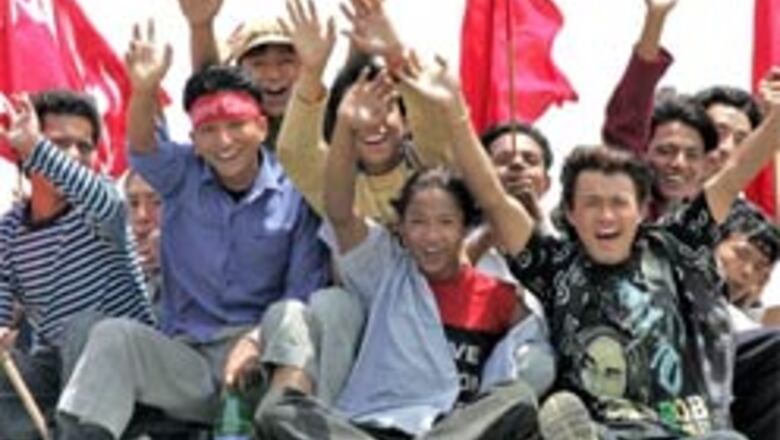
views
Nepal King Gyanendra's decision to revive Parliament in Nepal has been welcomed by India, which is now turning its focus on bringing back Himalayan kingdom to normalcy.
After the Cabinet Committee on Political Affairs meeting on Tuesday, Union Defence Minister Pranab Mukherjee issued a statement, welcoming the development in Nepal towards the restoration of multi-party democracy and handing over of political power to the representative of the people.
"This is the victory for the people of Nepal who have displayed extraordinary courage and reaffirmed their faith and commitment to freedom and democracy," Mukherjee said.
The unrest in the Himalayan kingdom has adversely affected the economic situation of the country.
Suggesting India was planning economic packages and financial aid for the country, Mukherjee said, "We are conscious of the challenges lying ahead for Nepal as it embarks on the journey towards restoring political stability, achieving economic recovery and finding a peaceful solution to the armed conflict."
"These challenges will require the positive contribution of all concerned drawing upon the support of the people of Nepal," he added.
As a close friend and neighbour, he said India had stood by the people of Nepal and is now ready to render "unstinted support to the people of Nepal in whatever manner they wish," he added.
The decision of the seven-party alliance (SPA) that has spearheaded the pro-democracy movement, which has forced the King to yield, has been welcomed in official circles in New Delhi.
"The ball now is in the court of SPA," official sources said earlier.
However, reports from Nepal that the Maoists have rejected the King's offer to reinstate Parliament and decided to continue their campaign against the monarchy have come as a dampener.
The Maoists had reached a 12-point agreement with SPA last year. India hopes they stay together.
New Delhi, in fact, wants the Maoists to join the political mainstream and participate in Parliamentary elections after giving up violence.
As for the King, India sees a ceremonial role for him because a Constitutional monarchy would add to political stability in Nepal. Whether Gyanendra would be able to stay on as a ceremonial Head of State depended on his own conduct over the coming weeks.
There are reports that the King was contemplating imposing emergency and using force to deal with street demonstrators last week. India stepped in quietly to tell him that such a course would be disastrous.
The economic situation in Nepal is a source of considerable worry with the Indian government, which is planning an economic package and financial aid for the country.
National Security Advisor M K Narayanan, traveling with Prime Minister Manmohan Singh in Germany, said in Berlin last night, "Finally, perhaps the King has seen the errors of his ways because he has already gone on air to announce his willingness to restore Parliament".
"There was a great deal of confabulation before that (King's decision). There was a lot of talking by Indian side and lot of others. I think all necessary steps have been taken," Narayanan said.
He said political parties in Nepal have more or less indicated that they will accept it (King's decision) and "we hope to have interim government in a couple of days".
He, however, pointed out that the King has not specified under which provision he would restore Parliament. He also sought to rubbish the observation by certain quarters that the King's earlier announcement was "too little too late".




















Comments
0 comment